Food Aid
I’m finally back in front of a computer screen; I spent the past week in the remote farming village of Zingpen, farming and generally trying to mimic a rural farmer’s life the best I could. I’m not sure that I succeeded as a farmer, but I can confidently say that I learned and saw more in that single week than I have in most of my placement. There's so much that happened that it's hard to know what to write about.
The one moment I'll definitely never forget was when I had the great fortune of witnessing the arrival of the infamous US Food Aid.
 Each term the Catholic Relief Services and USAID supply the village’s primary school with two metric tons of imported US Sorghum to help feed the students at lunches.
Each term the Catholic Relief Services and USAID supply the village’s primary school with two metric tons of imported US Sorghum to help feed the students at lunches. This food takes a lot of pressures off of the families; since the kids are in school they can’t help their families farm, and so a reliable source of food is essential.
This food takes a lot of pressures off of the families; since the kids are in school they can’t help their families farm, and so a reliable source of food is essential.
This community is completely made up of farmers—even the teachers go farm once their classes end.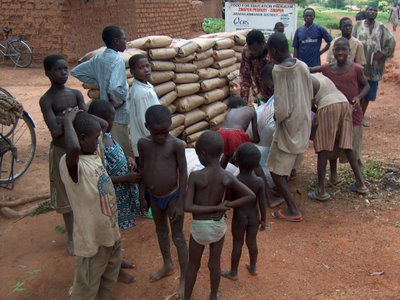
They are good farmers too, especially given what inputs and conditions they have to work with. Yet they’re seemingly caught in perpetual poverty. 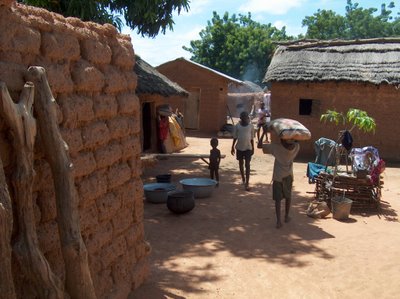 Throughout the week my probing about the farmer’s difficulties almost always resulted in the same answer: lack of market access.
Throughout the week my probing about the farmer’s difficulties almost always resulted in the same answer: lack of market access.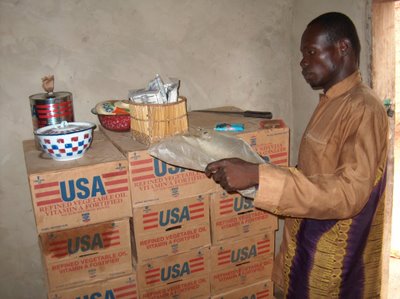 How much money does it cost to ship two metric tons of food from North America to the middle of nowhere in the upper corner of Ghana?
How much money does it cost to ship two metric tons of food from North America to the middle of nowhere in the upper corner of Ghana?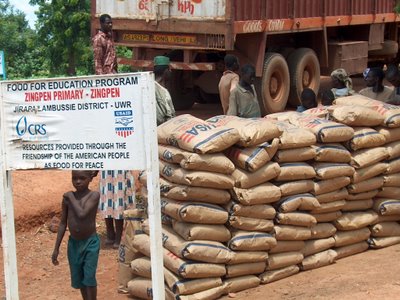
Would the money be better spent buying the abundant (and slowly rotting) crops of local farmers, instead of just dumping our produce on villages?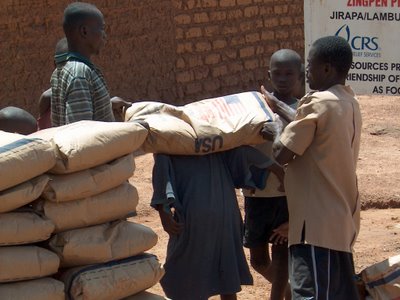




7 Comments:
What do i think? I think that is one of those ideas that as soon as you hear it, you think, 'Well, yea, how come they don't already do that?' The kind that seem so obvious once stated, but obviously weren't, or else it would already have been implemented.
In other words, once you finish school, go become CEO or whatever of some NGO and make changes.
(In other words, completely agreed, for once :)
Well - The food sent in a big mass from NA probably isn't just going to this community, rather it is probably going to a number of Ghanian/African communities, of which many aren't nearly as prosperous (crop wise) as Zinpen . . . so the cost is actually lowered when you factor that in. Haha, don't get me wrong though - I totally agree with you - if we're going to give, lets 'untie' our aid and start supporting their economy!
Is the reason a lack of market a problem because of lack of roads and transportation? Or other people unable to purchase the food produced?
Mobility, transportation and good roads is something that I am not nearly greatful enough for . . .
I think you're right that more money should be in helping farmers to sell their own crops. When you think about it it's like the saying, "you can catch a fish for a hungry man and he can eat for a week, or you can teach him how to fish and he can eat for a life time."
By us continually just giving them food and not helping them out with their market means that they will always have to count on us for help. If we help them with the market and things like that then they will be able to supply themselves and the money that had been put into just sending food can be used for other things like medical supplies and other things that can help improve their living.
And with what Emily said, if the transportation isn't thier then that makes things 100x more difficult...
but just like you said, scattered thoughts....
I don't think anyone knows the answer, so this is a band-aid for the situation until someone actually can sit down and figure out the first step.
Sometimes the things that sound blatantly obvious perhaps have some deeper issues that makes it harder to execute.
Also, by delivering food instead of supporting their eceonomy, as Jenn said, they will always have to depend on us for help. Maybe, for some sick reason, that's what they want.
I agree with you; there should be another way to help them instead of just dumping food and running. But what it is, I don't know.
ahhh the lovely food aid dilema. I've always thought that helping local farmers would make more sense. Free food or buying/trading for food? The majority of people are definatly going to chose the free food route. and so the cycle beings. Fewer customers for the farmers, lower profits, leading even to debt. And then the farmers suddenly become the ones chosing the free food since they no longer can sustain a living off of farming. Maybe if the money stopped going to North American farmers to supply the food, and went to helping local farmers become more accessable in their market areas, some headway could be made in breaking out of poverty's vicious cycles.
Great to see you're still doing well! Enjoy your last month!
Very interesting. I don't know much about it, but I'm reminded of the work done by CIDA to help very secluded communities in Africa; I think their major goal is to help the villages become self-sustaining. Surely it can't be much different from less isolated sites in developing countries that are so thoroughly dependent on foreign food aid.
Wow. You've been up to a lot of remarkable things out there. Keep it up, and keep us updated!
Just to shed a tiny bit of light on this, since i did a paper on it a bit ago. PL 480, which is the US food aid law, actually has US domestic interest written into it as a priority. So while it's easy to think that the US probably has the best interest of local farmers in it's mind, that's not always true. It's actually kind of messed up. Not that every case is the same. And more importantly, not that I know what I'm talking about at all since I'm very far from Ghana. But just thought I'd throw that out there.
Owen
Post a Comment
<< Home